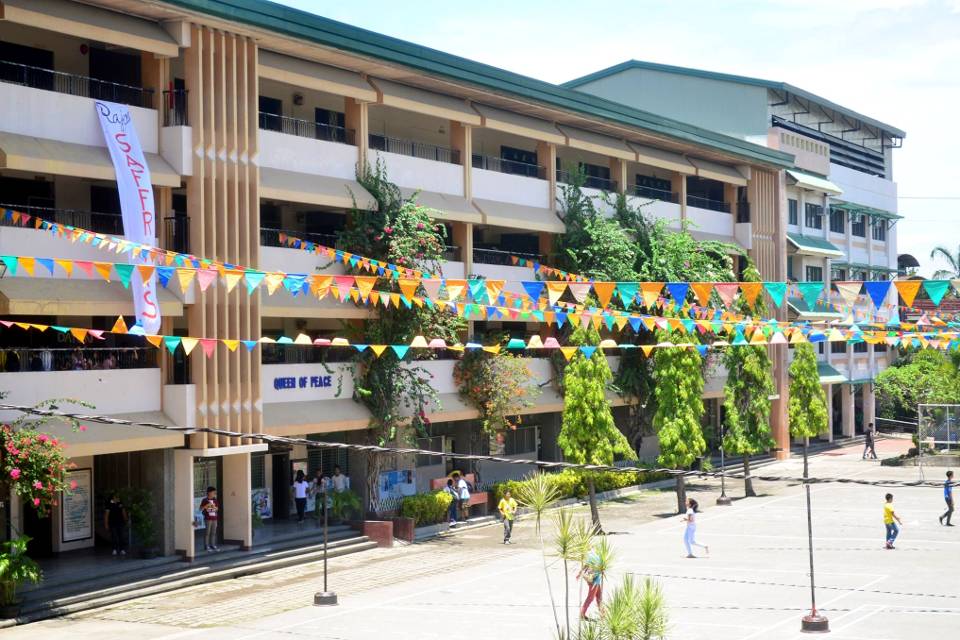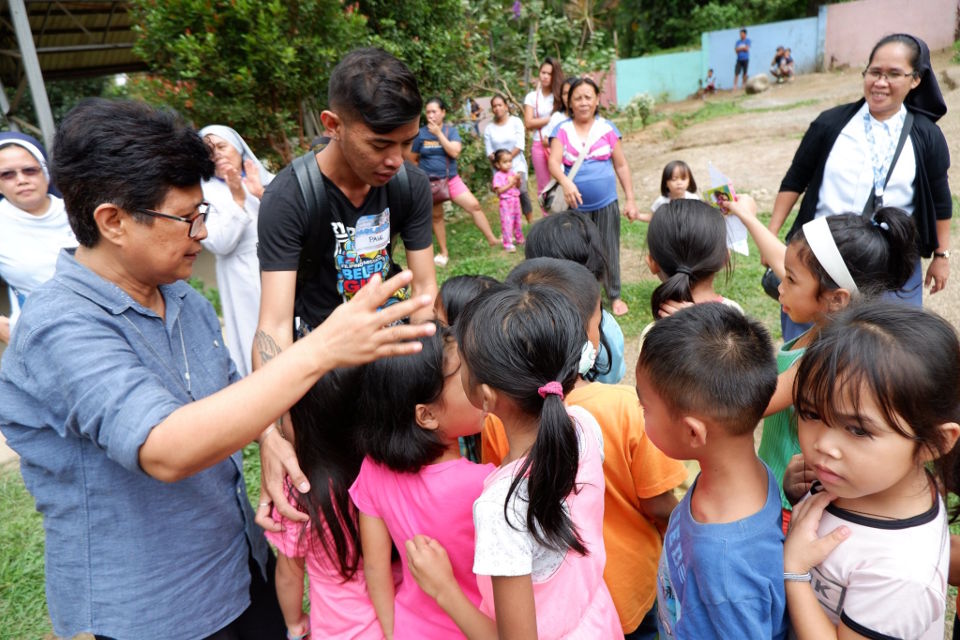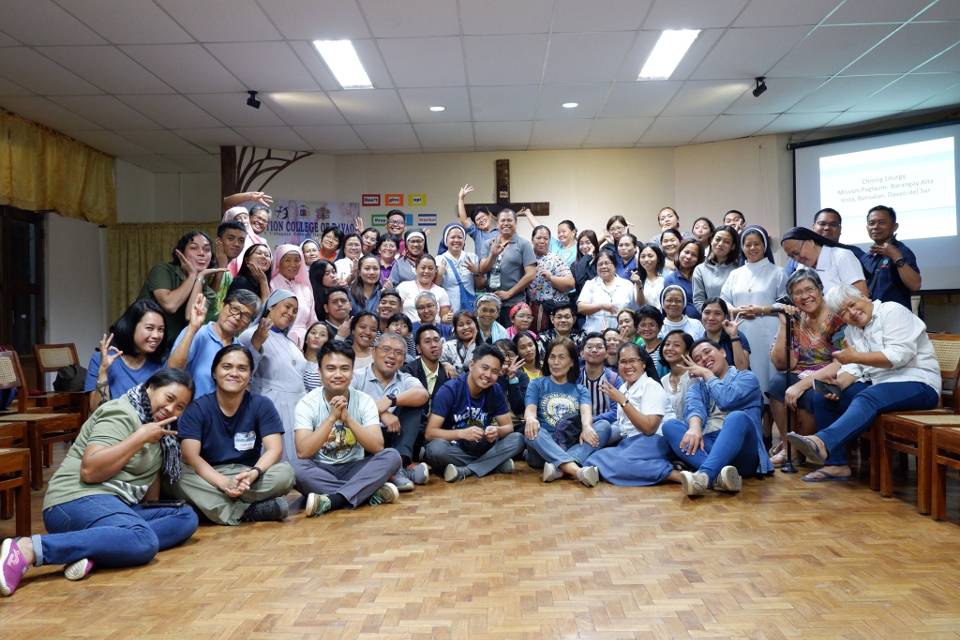Six Decades Strengthened by Faith and Solidarity
As we celebrate the Feast of the Assumption, we feature the Assumption College of Davao, an educational institution that through the years has moulded socially-aware and spiritually-grounded graduates who not only excel in their individual fields of work but also make valuable contributions to society at large.
THE FOUNDATION MOVED BY FAITH (1958-1968)
When the late Davao Archbishop Clovis Thibault sounded off the challenge for religious groups in the early 1950s to educate the young, little did he realize that there would be takers. After all, Davao was a virtual backwater town then, left depleted by World War II and struggling to restart its economy.
The Daughters of Mary of the Assumption, or f.m.a., founded by Archbishop Joseph Louise Melanson Campbelton of New Brunswick, Canada, took up the call. Two members of the congregation, Sr. Elodie Marie Richard (Mother del Annunciacion) and Sr. Oveline Doucet (Sr. Gaetance), packed their bags and headed off to Davao to lay the groundwork for setting up a school.
It was in 1958 that the Sisters opened a primary and secondary school, the Assumption Academy of Davao in an “open, swampy and desolate” piece of land in Agdao, Davao City. The academy began as an exclusive school for girls with Elementary and High School Departments. Enrolment was modest, at 84 elementary pupils and 86 high school students.
Shortly after, the school opened its College Department with 44 initial students. This prompted the appropriate name change to Assumption College of Davao (ACD).
Boys would start populating the Grade School in 1964, and Kindergarten pupils would subsequently begin filtering in. But these were just the beginnings for the many changes ahead.
MARY’S HOPE AND JOY AS A GUIDE IN THE AWAKENING PROCESS (1968-1978)
Hopelessness and the lack of joy ruined the nation towards the end of the decade as social unrest would tear through the fabric of Philippine society. This would heighten throughout the 1970s; during which authoritarian rule would gravely impinge on academic freedom. By this time, the social conflict heightened, leaving teachers grappling with new tools to put society in context. Despite this seemingly unjust situation, Mary’s inspiration for hope and joy guided the school as emerging concepts of liberation theology and approaches to education underwent a “profound shift.” The Sisters defined it as “teachings toward social transformation.”
But even as the world raged outside its walls, the ASD would revise and rewrite its mission. In 1977, the High School Dept. underwent an extensive review. Within two years, the Philippine Accrediting Association of Schools, Colleges, and Universities (PAASCU) issued its formal survey report. To this day, the PAASCU continues to challenge the school, which in turn has kept its pledge to constantly improve its services.
IN SOLIDARITY WITH THE POOR AND THE MARGINALIZED (1978-1988)
In the early 1980s, the Sisters’ orientation towards social transformation assumed a deeper dimension. Undergoing a process of “soul searching,” they discovered more progressive approaches to integrating community life and mission. These they found through the intensive and extensive community engagements, social orientation seminars, and faith-life sharing that enabled them to explore social realities and their implications to the impressionable youth guided with a deeper faith in Christ and the inspiration of Our Lady of the Assumption.
It was in 1982-83 that the school underwent a process of reorientation by evaluating the mission statement and articulating the school thrust in light of Philippine social realities. The school curriculum was consequently modified.
THE EMERGENCE OF THE NEW MISSION (1988-1998)
On April 1, 1989, in its third decade, a new society of apostolic life was born. This unfolded when 29 members of the Missionaries of the Assumption separated from the mother congregation and were granted the ownership and management of the Assumption School (now College) of Davao.
Since then, there has been no turning back. A solid history of progressive active involvement and academic competence has secured the institution as one that provides holistic education to the youth. Involvement in exposure immersions, social mobilization, and supporting the mass movement of the marginalized was encouraged and systematized. In the early part of the 1990s, the school banned all junk food products from its canteen, a bold directive aimed at encouraging its nationalist political stance, ecological protection, emphasizing good nutrition and better health among the youth.
It was also around this time when the Sunday High School Program was launched, designed for poor yet deserving children. In 1994, only 100 students enrolled in the First Year Level then it climbed to nearly 1,400 students for all year levels. We now name it the Modified Work and Study Program (MWSP).
WHOLENESS IN TOTALITY OF GOD’S CREATION (1998-2008)
At the start of the fourth decade, the concept of wholeness and totality of God’s creation was revitalized emphasizing imperatives for ecological relationship and solidarity with the indigenous or Lumads and Bangsamoro people. It was the decade of reestablishing Assumption from basic education to a higher educational institution.
The year was 1998 when it re-opened its College Dept. (it was discontinued in 1978 when it did not have enough teachers with a masters’ degree) and was renamed Assumption College of Davao (ACD). This time, ACD offered degrees in English, Sociology, and Education. It also put out full courses in Computer Programming, Computer Secretarial, Computer Technology, and Hotel and Restaurant Management. It also offered 2-Year technical and vocational courses that brought in the establishment of a new school, the Assumption Technical and Vocational Institute that later became the Assumption Polytechnic College of Southern Mindanao.
In 2004, the Grade School Extension for Lumad Children was established together with the indigenous peoples as per the identified needs of the community. Through formal education, it aimed in improving the future lives of the Lumads in promoting their indigenous culture, defense for their ancestral domain and right to self-determination, livelihood development through sustainable agriculture, and literacy-numeracy.
Since 2008-2009, The Assumption College of Davao has intensified its constant review and operationalization on its Vision Mission Goals, as its contribution to the transformation of our educational system and society in general. It established mechanisms based on its capacity as an institution of learning. The review was followed by the institutionalization of the Ecozoic Principles in its curriculum and lifestyle to express its concern and relationship to God’s creation and as an expression of the school’s environmental standpoint.
THE JOURNEY CONTINUES TOWARDS NEW EVANGELIZATION AND INTERNATIONAL SOLIDARITY (2008-2018)
As the journey continues, the school strengthened its active participation in both community work and advocacies responding to the Church’s call toward new evangelization and international solidarity.
It was in 2009 that our Justice and Peace, Ecological Integrity, Engaged Citizenship, Poverty Reduction, Gender Sensitivity, and Youth Empowerment Advocacies in line with the Catholic Educational Association of the Philippines (CEAP) were institutionalized.
In the year 2011, ACD offered the Bachelor of Science in Business Administration to continue its mission of educating the students to reach out to communities, now sharing knowledge for economic sustainability. The Bachelor of Science in Social Work specializing in community organizing, mobilization, and development among the sectors of the Indigenous People and the Moro people was also opened. Our BSSW now ranked 8 in the national performance of the Licensure Examination for Social Work and ranked 1 in our region. New courses will be offered in line with the school’s social orientation and its principles of transformative education.
With the opening of the Senior High School Program in 2016 which offers all strands and the construction of the new building named Queen of the Universe, our mission for a Catholic and quality transformative education with social conscience expanded.
Since 2016, as the Missionaries of the Assumption are gearing towards expanding their mission to foreign lands, the ACD is in the direction for internationalization as it is now engaging international partnerships with international institutions and agencies.
In 2018, a new organizational structure was approved by the Board of Trustees (BOT). The new Management Council headed by the President assisted by the Directors for Administration, Academic Affairs, Formation, and Community Engagement, and Finance was established. Institutional offices clustered into teams were supervised by its Heads and academic departments were headed by a Principal and Program Deans with academic supervisors and coordinators.
The school year 2020-2021 was marked by the COVID-19 pandemic. The school adopted a no face-to-face mode of learning delivery towards a flexible learning and blended modality. The options for online and modular were provided among students as the institution implemented its precautionary measures among educators by implementing flexible working arrangements like options on work-from-home, work onsite, and skeletal arrangements.
Even in these trying times of pandemic, we have come a long way from Archbishop Thibault’s call for vocation and humble beginnings on the “swampy and desolate” Agdao. With Christ, the center of our school and Our Lady of the Assumption as inspiration, and the guidance of the Missionaries of the Assumption, this vision for true education continues.
ACD further expands its reach to provide quality, Catholic, and transformative education along with its inter-faith and social orientation. (Jopriz M. Bueno)
(Jopriz M. Bueno is Director for Administration Head, Research and Planning Office of the Assumption College of Davao.)





No Comments